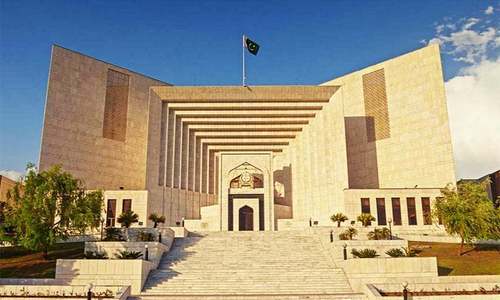ISLAMABAD: As scores of affected employees gathered outside since morning, the Supreme Court observed on Thursday that the government’s stand on the sacked employees’ case seemed to be more populist than legal.
But after much insistence by Attorney General for Pakistan (AGP) Khalid Jawed Khan and lawyers representing different employees, a three-judge Supreme Court bench, headed by Justice Umar Ata Bandial, restrained the government from evicting the employees from official residences they were living in till a decision comes on the review petition of the federal government challenging the Aug 17 judgement, which has rendered about 16,000 employees jobless creating much hue and cry.
On the eve of his retirement, Justice Mushir Alam had declared illegal and unconstitutional a PPP-era law called the Sacked Employees (Reinstatement) Act 2010 (SERA) under which a number of people were employed or promoted during 1989-90.
On Thursday the apex court ignored a request by the AGP to suspend the Aug 17 judgement till the time the court comes to a conclusion whether to revisit the judgement or uphold it.
Apex court restrains government from evicting them from official residences
The court however issued a notice to the AGP under Order 27A Rule 1 of the Civil Procedure Code (CPC) in addition to issuing notices to the 16,000 employees who were not heard by the court at the earlier stage, but with an observation that rather than inviting a tsunami of affected individuals the court would implead them and club other review petitions with the present petition.
The court will resume hearing on Nov 29 on a day-to-day basis. It directed the lawyers representing different petitioners to furnish a synopsis outlining aspects to be examined.
“We are not inclined to suspend the judgement on the first day of hearing since giving a relief at this stage is a bit premature and complete reversal of the judgement,” observed Justice Bandial after consulting other members of the bench. However, he suggested to the AGP that the government could compensate or grant financial assistance or any relief or allow the sacked employees to work in the organisations they were employed in until the case was decided.
The AGP replied that the government could not compensate the sacked employees, requesting the court to allow them to continue their jobs till the final decision of the court.
Justice Qazi Mohammad Amin Ahmed observed that the court was sitting with an open mind and heart, adding that Pakistan is a country of 220 million people and not that of 16,000 alone besides the court has to focus more on transparency and merit than anything else.
There were complaints that many of these employees drew salary while sitting at home and without actually doing work, Justice Ahmed observed.
Advocate Raza Rabbani, who was representing officers of the Intelligence Bureau, told the court that the sacked employees were at the verge of getting evicted from their residences. Besides, he added, 31 of such employees had died and weddings of others daughters had been delayed.
Advocate Iftikhar Gillani said a number of government schools had been closed because the school teachers he was representing had been sacked.
The AGP said it was his job to defend the Act passed by the parliament but emphasised that the present case should be considered more on humanitarian ground since a number of employees were sent home when they were at the verge of retirement and could not find any job at the twilight of their career. The court should consider that these were not 16,000 individuals but 16,000 families, he said.
Citing a number of judgements, especially the 1992 Aftab Sherpao case, the AGP said the apex court had already held that in cases like the present where the vires of the statute had to be examined, the issuance of a notice to the AGP was mandatory. But in this case though a notice was ordered in 2010 but no formal notice was issued and served to the AGP.
Accordingly, the AGP said, he was not heard on the question of vires of the SERA before it was declared ultra vires of the constitution.
He argued that the Aug 17 judgement suffered from material defects since it was passed in ignorance of an earlier verdict of 2015 in the Ghulam Rasool case.
In the petition, the government has contended that the principles of transparency, merit and due process in public employment require that the employees benefitting under the SERA may not be rendered jobless merely owning to deficiencies and therefore their legitimate rights and interests should be protected which does not prejudice other employees.
The petition explains that the SERA neither was meant for nor applied to the services of the civil servants whose services were governed under the provisions of the Civil Servants Act 1973 and the rules frames under it.
The SERA, as stated in its preamble, the petition argues, was meant to provide relief to those persons in corporation service or autonomous, semi-autonomous or government service which do not fall within the ambit of the civil servants act.
The petition regrets that the principle of severability of the statute was not applied and the entire SERA was declared ultra vires though provisions which merely protected the employees by reinstatement or regularisation of service without affecting right or interest of any existing employee could have been saved by the court.
After being passed by the parliament, the SERA received the assent of the president on Dec 6, 2010. Prior to the promulgation of the SERA, ordinances were also promulgated by the president to the same effect as the act. The act was passed to reinstate the people who were earlier employed in different corporations, autonomous or semi-autonomous bodies or government service but were later dismissed.
Published in Dawn, November 12th, 2021














































